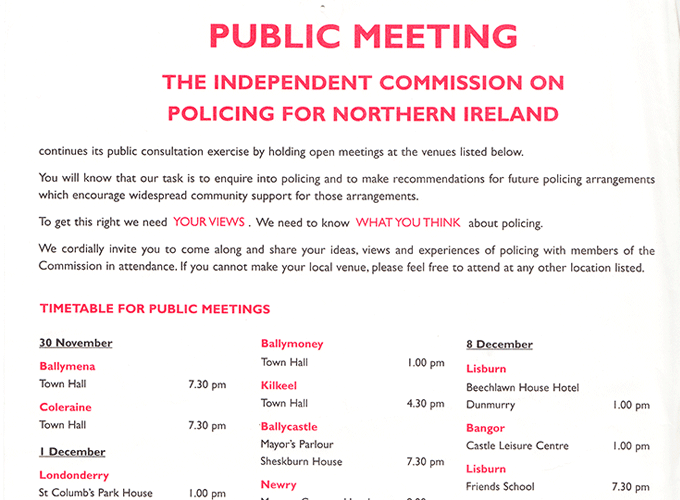Description
A notice for a series of public meetings held by the Independent Commission into Policing. The Belfast or Good Friday Agreement was signed on 10 April 1998 after multi-party negotiations. The document contained proposals for a new Northern Ireland Assembly with a power-sharing executive, a new constitutional relationship between the two parts of Ireland and new north-south ministerial bodies. The document recommended that paramilitary weapons be decommissioned and policing and criminal justice be appraised.
With political deadlock around the future role of policing, an Independent Commission into Policing in Northern Ireland was established. Conservative politician, Chris Patten led the team of former police officers, a QC, academics and a business woman. Their aim was to consult widely and make recommendations for policing structures, arrangements, composition, recruitment, ethos and symbols that would encourage widespread community support.
In October 1998, the commission began with a programme of forty fact-finding public meetings that were attended by 10,000 people across Northern Ireland. The commission was supported and facilitated by a handful of dedicated Royal Ulster Constabulary (RUC) officers who provided the team with access to police archives. The commission also traveled to other countries to review different public sector services and institutions. The Patten report was published in September 1999 and endorsed by Chief Constable Flanagan. The document contained 175 recommendations which aimed to transform the RUC into a modern, community-based police service. Recommendations included that the RUC be renamed and have a new oath and badge. The establishment of a new policing board to hold the chief constable and the police service publicly to account. A reduction in strength to 7,500, and an increase in Catholic recruits. A new structure that would reflect local government divisions and a new District Policing Partnership Board for each council to reflect community concerns and priorities.
Political reaction was mixed, Republicans were disappointed that the RUC was not disbanded. The Unionists were hostile to the proposals and instigated a “Defend the RUC” campaign to prevent the name and badge being changed. Many of Patten’s recommendations were implemented in the Police (Northern Ireland) Act 2000.
Links
- Related objects > RUC memorial poster, George Cross booklet
- Related objects > Photograph of Musgrave Street PSNI Station
- Related objects > PSNI bicycle
- Related objects > GAA shirt presented to chief constable
- Related objects > PSNI detective chief constable uniform & cap
- BBC News - On this day: Patten report released
- CAIN: Summary of Patten report recommendations
- CAIN: Policing (Northern Ireland) Bill 2000
- CAIN: Policing in Northern Ireland
- BBC History: Good Friday Agreement
- BBC Schools: Good Friday Agreement: Policing and Justice



